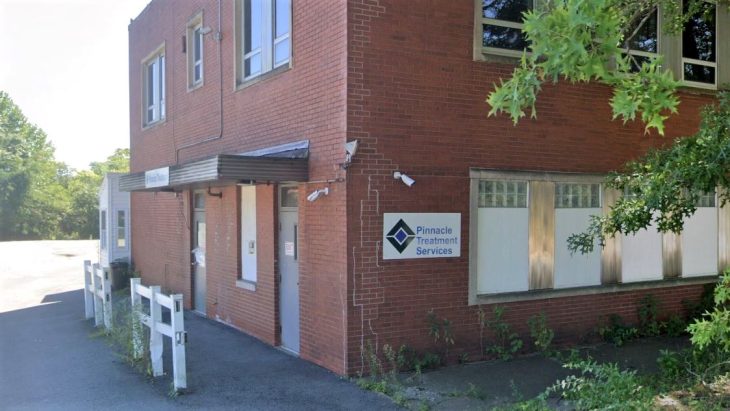Pinnacle Treatment Services of Aliquippa

About Pinnacle Treatment Services of Aliquippa
For detoxification services in Aliquippa, Pennsylvania, Pinnacle Treatment Centers is one of your options. The Pennsylvania Department of Human Services designated this as a Center of Excellence (COE).
They offer inpatient, medically monitored detoxification through their program partners, after which you can start an outpatient program at the Aliquippa facility. The outpatient programs include medication assisted treatment (MAT) and counseling for co-occurring mental health issues.
Clients can use most commercial insurance plans, Medicare, Medicare Advantage, and Medicaid to pay for treatment. They also have self pay options and accept out of network insurance. Clients can smoke in designated areas of the facility.
Self Care During Addiction Treatment in Aliquippa, Pennsylvania
Aliquippa was once known as a major hub for steel production. The steel mills no longer operate, but the city has remnants of its storied past when they were home to the world’s largest integrated steel mill.
The facility is close to Hopewell Community Park, which offers many amenities and recreational activities. There are fitness and hiking trails, pavilions, a playground, and the Larry Blaney Nature Center. Clients in outpatient programs can spend some self care time in the park between treatments.
Dual Diagnosis Treatment Tracks
The program offers comprehensive treatment for clients with a dual diagnosis. Some of the therapy modalities include rational emotive behavior (REB), cognitive behavioral therapy (CBT), and trauma related counseling.
Clients in the program have good things to say about the center, such as “It’s a great place to get better.” Another said that these treatment services definitely saved his life and that the nurses and doctors were nice.
Clients work on life skills development and relapse prevention. Staff at the center also facilitates 12 step programs. From detox to discharge planning, this is a comprehensive addiction treatment facility.
| Levels of Care | Detox Service Setting | Programs | Payment Options | |||
|---|---|---|---|---|---|---|
|
In outpatient therapy, you’ll attend therapy sessions several times each week while living at home. This is ideal if you have a strong support system and a lower risk of relapse. Outpatient treatment offers flexibility to maintain work, school or family obligations. |
Dual diagnosis programs address substance use disorders and co-occurring mental health conditions simultaneously. This integrated approach to care improves the likelihood of long term recovery and stability by addressing the root causes of addiction. |
|||||
|
Outpatient detox gives you access to medically supervised withdrawal services while still allowing you to live at home. You’ll attend a clinic for treatment and monitoring. This flexible option is suitable for those with mild to moderate withdrawal symptoms who have strong support systems. |
||||||
|
Adult programs address the substance use and life challenges specific to adults. Therapists can deliver sessions in individual, group and family settings. Services often include job support and life skills training in a structured environment. |
Alcohol detox programs offer medical support to help individuals withdraw safely from alcohol. Your care team may use medications to ease your symptoms and provide medical monitoring to address complications. |
Drug detox programs support individuals who are withdrawing from addictive substances like cocaine and heroin. Medical support helps you manage symptoms in a controlled and safe environment so you can achieve initial sobriety. |
Men's programs address substance use while also considering the social pressures, family roles and mental health concerns that are specific to men. You’ll learn healthy coping mechanisms as you build emotional resilience and develop communication skills. |
Opioid detox uses medications to ease severe withdrawal symptoms. It also includes medical supervision to help you manage potential complications. These services allow you to stabilize and begin a recovery plan. |
Women's programs offer a safe and supportive space to focus on gender specific issues such as trauma, family roles and mental health conditions. Therapists tailor the sessions to address women's needs and foster empowerment in a healing and nurturing environment. |
Young adult programs are designed for individuals who are transitioning into adulthood. Topics of discussion typically include identity, independence and peer relationships. Providers may also offer life skills training and career support. |
|
Medicaid
|
Self Pay
|
Levels of Care
In outpatient therapy, you’ll attend therapy sessions several times each week while living at home. This is ideal if you have a strong support system and a lower risk of relapse. Outpatient treatment offers flexibility to maintain work, school or family obligations.
Dual diagnosis programs address substance use disorders and co-occurring mental health conditions simultaneously. This integrated approach to care improves the likelihood of long term recovery and stability by addressing the root causes of addiction.
Detox Service Setting
Outpatient detox gives you access to medically supervised withdrawal services while still allowing you to live at home. You’ll attend a clinic for treatment and monitoring. This flexible option is suitable for those with mild to moderate withdrawal symptoms who have strong support systems.
Programs
Adult programs address the substance use and life challenges specific to adults. Therapists can deliver sessions in individual, group and family settings. Services often include job support and life skills training in a structured environment.
Alcohol detox programs offer medical support to help individuals withdraw safely from alcohol. Your care team may use medications to ease your symptoms and provide medical monitoring to address complications.
Drug detox programs support individuals who are withdrawing from addictive substances like cocaine and heroin. Medical support helps you manage symptoms in a controlled and safe environment so you can achieve initial sobriety.
Men's programs address substance use while also considering the social pressures, family roles and mental health concerns that are specific to men. You’ll learn healthy coping mechanisms as you build emotional resilience and develop communication skills.
Opioid detox uses medications to ease severe withdrawal symptoms. It also includes medical supervision to help you manage potential complications. These services allow you to stabilize and begin a recovery plan.
Women's programs offer a safe and supportive space to focus on gender specific issues such as trauma, family roles and mental health conditions. Therapists tailor the sessions to address women's needs and foster empowerment in a healing and nurturing environment.
Young adult programs are designed for individuals who are transitioning into adulthood. Topics of discussion typically include identity, independence and peer relationships. Providers may also offer life skills training and career support.




